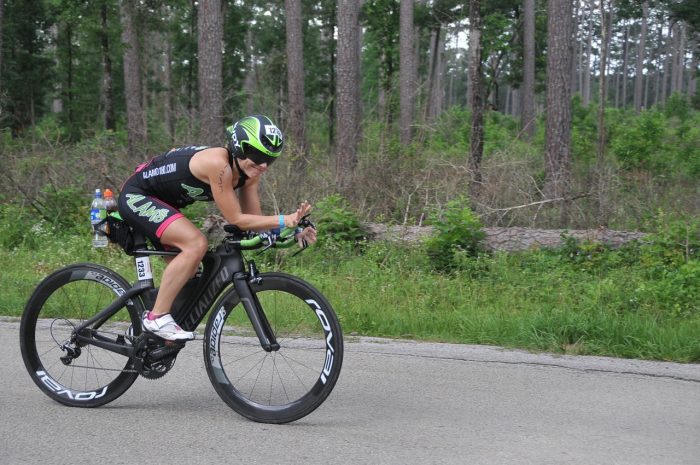I am a former triathlete—an Ironman, in fact.
I will never forget that long and humid day—swimming, biking, and running in my Houston hometown—bawling like a baby as I ran across the finish line after 13 and a half hours and 140.6 miles. It was the hardest thing I’ve ever done and the greatest accomplishment of my life.
For years, the sport of triathlon dominated my life and eventually led to a job, coaching beginners. I learned a lot about myself and ended up sharing many of these lessons with my athletes, as I often helped them work through self-esteem issues, lack of confidence, and fears of failure.
At the time, the lessons felt specific to the sport, but now as I’m nurturing a different passion, I can see how they apply to any goal in life.
1. Stop believing our inner bully.
When I began triathlon training, my inner voice was constantly mean and critical.
She made me question everything I was doing and told me I couldn’t possibly be serious about becoming a triathlete. She told me that it wouldn’t be long before I gave up and quit, like I had with everything else in my life.
She laughed at me as I was learning to swim and never let me forget how slow I was in the water. She laughed at me when I stopped at a stop sign and fell to the ground in front of my teammates; my inexperience with clipping into the bike pedals evident when I couldn’t get my foot free fast enough to catch myself. She laughed at me when shin splints plagued my legs, and I walked more than I ran.
Her berating was so frequent that I believed her, and it even ruined my first triathlon—an event that should have felt like an incredible achievement. I cried after I learned my final race time—not tears of joy, but tears of sadness and anger that it took me so long to cross the finish line. I began to wonder if I should even bother. The negative voice was sabotaging my happiness.
But with encouragement from my fantastic coaches and teammates, I slowly stopped listening to—and believing—that ugly voice. As I began racing more often, my confidence in my ability to commit to the sport grew by leaps and bounds, and it felt like I was proving something to my inner critic.
It took a while, but when I finally stopped allowing her to bully me, a beautiful thing happened: I actually began to notice my accomplishments. I’d been improving all along, but it took tuning that voice out—purposely telling her to shut the hell up—to see how far I’d actually come.
“If you hear a voice within you say, ‘you cannot paint,’ then by all means paint, and that voice will be silenced.” ~ Vincent van Gogh
This lesson applies to everything—our jobs, schooling, parenting, relationships—you name it. Our self-talk influences us, and if it’s negative, it can affect us in a bad way. We cannot let ourselves be bullied by our critical inner voice.
Chances are, it’s lying, and we’re only believing it because we’ve listened for too long. The negative self-talk can wear even the most confident person down given enough time the toxicity filtering into the way we think, slowly poisoning our view of ourselves.
Once we stop giving so much weight to that voice, we will begin to notice the good things happening, and our outlook on life and how we feel about ourselves will vastly improve.
2. Success is relative.
When I was first learning how to properly swim the freestyle, I would get frustrated at how slow I was. After swimming more than a mile in the pool, I’d find myself feeling defeated because it killed me and yet, seemed effortless to others. I remember expressing this to my coach while I was hanging onto the pool deck, huffing and puffing, trying to catch my breath after swimming a 50-yard lap.
She told me that speed is relative. It is not independent; factors like experience, gender, size, and even attitude can determine an athlete’s speed. Something instantly clicked. I then understood that my perceived failure was because I was comparing myself unfairly to other athletes.
Speed is another word for success in this life lesson. Success is not absolute; it is a relative term.
We can’t compare our achievements to other people’s because what is successful for them may not mean the same thing for us. Just because we may not be in the same place in life as someone else—with their high-paying job, living in a beautiful stone house with the mountain view, and driving an oversized SUV with three rows to fit their perfect nuclear family of five—doesn’t mean we’re not successful, too.
“Success is to be measured not so much by the position that one has reached in life as by the obstacles which he has overcome.” ~ Booker T. Washington
We all have different obstacles and standards. There is no universal definition of success. We need to measure our success by what it means to us, not by comparing ourselves to what we perceive as successful for another.
3. Comparison kills empathy.
An interesting and welcoming thing happened when I stopped comparing myself to my teammates and other triathletes; I became genuinely happy for their success. I noticed their hard work and felt they deserved their personal records and podium awards.
“Persons of high self-esteem are not driven to make themselves superior to others; they do not seek to prove their value by measuring themselves against a comparative standard. Their joy is being who they are, not in being better than someone else.” ~ Nathaniel Branden
Before, when I unfairly believed I needed to be as good as others or at the same level, I found myself feeling jealousy and resentment. I mistakenly thought they were just lucky or had raw talent that made things easier for them as if they didn’t have to work as hard as me. It was difficult to give them credit because it didn’t seem like they really had to earn the rewards that felt impossible or out of reach for me.
Once I learned to let go of comparison and I realized that we were all on our own triathlon journey with many variables that affected our performance, I found empathy for my community, and my inner cheerleader was born.
This can be said for life, comparison will always kill empathy. If we are constantly feeling upset that others are further ahead or doing better than us, we will miss out on seeing the beauty of accomplishment for our fellow man. It can turn into a poisonous judgement against ourselves for not measuring up, spoiling the genuine joy we feel when those we care about succeed.
4. Compete with rather than against yourself (or others).
After I learned to stop comparing myself to other triathletes, I developed a healthy competition with myself. It was a great motivator for me.
It roused me on the early mornings before dawn when I didn’t want to crawl out from under my warm and cozy blankets to go train in the cold. It drove me to jump in the lake on the days when I’d see white caps on the water, knowing it was going to be a rough and tough swim. It persuaded me to train when I’d take a look at the weather forecast before mounting my bike, knowing I’d have to fight double-digit mile-per-hour headwinds or before lacing up my shoes, knowing I would be running in 100 degree Texas heat.
I knew I had to commit to my training, otherwise I’d never make it across the finish lines of the races I set out to participate in.
Competing against yourself rather than against others continues the lesson of letting go of comparison, but we need to take it a step further.
“The goal you set must be challenging. At the same time, it should be realistic and attainable, not impossible to reach. It should be challenging enough to make you stretch, but not so far that you break.” ~ Rick Hansen
Competition can be a great motivator for self-improvement, but it can also get ugly, even against ourselves. It can be easy to fall into a vicious cycle of self-hate if we set ourselves up for failure with unrealistic expectations or if we show a lack of commitment to our goals.
This is why we need to compete in a healthy way—with ourselves rather than against.
It’s okay to set ambitious goals, but we need to be realistic with them. We need to be sure it’s actually something we can achieve with simple and repeatable actions. And while we will always be a work-in-progress, we also have to work to progress. It has to be a practice. We have to be consistent with our actions, or we’ll be competing against rather than with ourselves.
You don’t have to be a triathlete to learn and benefit from these life lessons. They can help any of us having a hard time believing in ourselves or letting insecurities get in the way of creating the life we most desire.
“Once we believe in ourselves, we can risk curiosity, wonder, spontaneous delight, or any experience that reveals the human spirit.” ~ E.E. Cummings
~


 Share on bsky
Share on bsky





Read 23 comments and reply